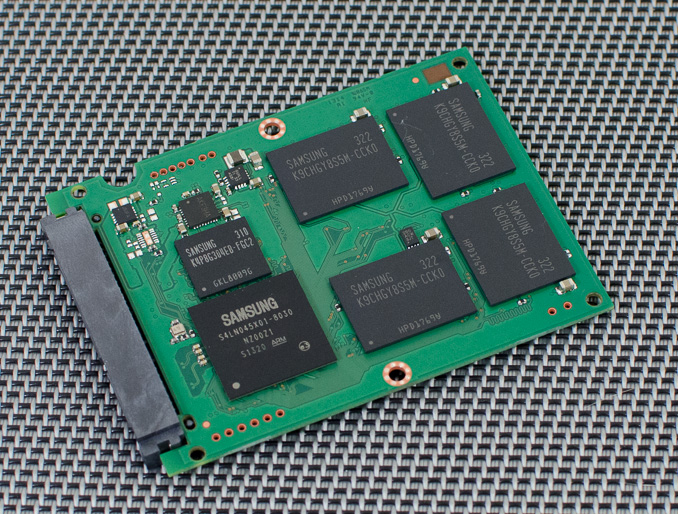Samsung SSD 840 EVO Review: 120GB, 250GB, 500GB, 750GB & 1TB Models Tested
by Anand Lal Shimpi on July 25, 2013 1:53 PM EST- Posted in
- Storage
- SSDs
- Samsung
- TLC
- Samsung SSD 840
Final Words
I was extremely excited about Crucial's M500 because it was the first reasonably priced ~1TB SSD. Even though its performance wasn't class leading, it was honestly good enough to make the recommendation a no-brainer. The inclusion of features like eDrive support were just the icing on the cake. With the EVO, Samsung puts forth a formidable competitor to the M500. It's faster, uses less power at idle and carries lower MSRPs for most of the capacity range. Microsoft's eDrive standard isn't supported at launch, but Samsung expects to change that via a firmware update this September.
Endurance isn't a concern with TLC for client workloads, although I wouldn't recommend deploying the EVO in a write heavy database server or anything like that.
The additional features that Samsung threw in the pot this round really show some innovative thinking. TurboWrite does a good job of blurring the lines between MLC and TLC performance, while Samsung's RAPID DRAM cache offers adventurous users a way of getting a taste of high-end PCIe SSD performance out of an affordable TLC SATA drive.
The 1TB version is exciting because it offers a competitive price with the 960GB M500 but with better performance. It's also good to have an alternative there as the 960GB M500 has been supply constrained at times. At first I didn't believe that Samsung's TLC strategy could hold weight against the Intel/Micron approach of aggressively pursuing smaller process nodes with MLC NAND, but the EVO does a lot to change my opinion. I'd have no issues with one of these drives in my system even as primary storage. The performance story is really good (particularly with the larger capacities), performance consistency out of the box is ok (and gets better if you can leave more free space on the drive) and you've got Samsung's firmware expertise supporting you along the way as well.

To say that I really like the EVO is an understatement. If Samsung can keep quantities of the 840 EVO flowing, and keep prices at or below its MSRP, it'll be a real winner and probably my pick for best mainstream SSD.











137 Comments
View All Comments
spazoid - Thursday, July 25, 2013 - link
It's free. Free is better.jhh - Thursday, July 25, 2013 - link
Are there any latency measurements in milliseconds as opposed to IOPS? With IOPS, the drive may be queuing rquests, making it difficult to translate IOPS to milliseconds per request.Kibbles - Thursday, July 25, 2013 - link
If I write 1gb/day on average to my SSD, since media files go on my home server, this drive would last me 395 years LOL!sheh - Thursday, July 25, 2013 - link
Anand, would you consider writing an article on the other aspect of endurance: data retention time? With TLC entering the fray it's starting to get even more worrying.It'd be interesting to know how retention time changes throughout a drive's life, trends in the last few years, differences between manufacturers, the effect of the JEDEC standard, whether there's any idle-time refreshing for old written cells, etc.
And an idea: I'd like to see drives where you can configure whether to use the drive as SLC/MLC/TLC. Switch to SLC for reliability/performance, TLC for capacity.
MrSpadge - Saturday, July 27, 2013 - link
"And an idea: I'd like to see drives where you can configure whether to use the drive as SLC/MLC/TLC. Switch to SLC for reliability/performance, TLC for capacity."Or a drive which switches blocks from TLC operation to MLC as it runs out of writes cycles. And finally to SLC.. at which point in time it should last pretty much infinitely.
mgl888 - Thursday, July 25, 2013 - link
Great article.Does RAPID require that you install a separate driver or does it just work automatically out of the box? What's the support like for Linux?
bobbozzo - Friday, July 26, 2013 - link
It's a driver, for Windows.TheinsanegamerN - Saturday, July 27, 2013 - link
and i dont think that rapid has a reason to be on linux. linux is already much better with ssd writes than windows.chizow - Thursday, July 25, 2013 - link
Minor spelling correction: http://www.anandtech.com/show/7173/samsung-ssd-840..."counterfit" should be "counterfeit"
chizow - Thursday, July 25, 2013 - link
Nice review Anand, I'm really glad to see almost all the top SSDs from numerous makers (Samsung, Crucial, SanDisk, Intel) are creeping up and exceeding SATA2 specs across the board and nearly saturating SATA3 specs.It really is amazing though how Samsung seems to be dominating the SSD landscape. I know this review is a bit skewed though since you presumably tried to include almost all the Samsung capacity offerings (for comparison sake), but the impact of the 840, 840 Pro and now the 840 EVO on the SSD market are undeniable. They really have no weaknesses, other than perhaps the Seq. Write Speeds on the 840/EVO.
I guess this is why there's so many deals currently on the 840, I bought the 250GB version earlier this month and don't really regret it given the price I got it for, but the EVO is certainly a step up in nearly every aspect.